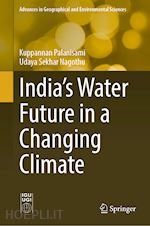
Questo prodotto usufruisce delle SPEDIZIONI GRATIS
selezionando l'opzione Corriere Veloce in fase di ordine.
Pagabile anche con Carta della cultura giovani e del merito, 18App Bonus Cultura e Carta del Docente
This book comprehensively addresses the most challenging water issues in India in a changing climate for the first time and suggests potential solutions. It has been observed that over the past two decades, water usage has significantly increased in India due to population growth, economic development and an increase in multiple uses of water, including irrigation, hydropower, industries, domestic consumption, fisheries, eco-system needs and the environment. India’s water future is mainly influenced by rising food demand to feed the increasing population, emerging climate change impacts on agriculture and the water sector, the increasing cost of interventions, poor cost recovery, the low level of technology adoption and weak water policy.
Overall, this book is one of the first of its kind to present India’s future water and irrigation issues with field-based solutions, providing lessons learnt from successful national and international case studies. The volume is a useful resource for a wide range of readers including policy makers, planners, donors, implementing agencies and researchers in the water sector.
Agriculture and Irrigation in India – Trends and Turning Points.- Water future: Drivers of changing climate and impacts.- Stabilizing the canal irrigation.- Sustaining groundwater irrigation.- Reviving tank irrigation.- Maximizing wastewater reuse.- Enhancing water productivity and climate smart technologies.- Re-estimation of crop water requirement (CWR).- Up-scaling micro irrigation.- Expanding hill water management.- Reworking on Cost Sharing and Irrigation Subsidies.- Current Best Practices in Irrigation Management.- Strengthening Institutions, Policy and Governance.- India’s Water Future- A Way Forward.
Dr. Kuppannan Palanisami is an international water expert with 40 years of experience in irrigated agriculture, water economics, technology adoption, water planning and climate change. He was a visiting professor at the University of Minnesota, USA, from 1982 to 1984 and again in 1990; a visiting fellow at Khon Kaen University, Thailand, from 1984 to 1985; and also worked at the International Rice Research Institute (IRRI), Philippines, from 1986 to 1988. He was a visiting researcher at Waseda University, Japan, in 2000, and the Research Institute for Humanity and Nature, Japan, in 2004. He worked as an expert consultant for the United Nations Food and Agriculture Organization (FAO) for four East African countries in 1997 and worked on the International Fund for Agricultural Development (IFAD) funded projects in seven Asian countries. He was the Director of the Water Technology Centre and CARDS at TamilNadu Agricultural University from 2000-2008 and then served as Principal Researcher and Director IWMI-Tata Program at the International Water Management Institute (IWMI) from 2008-2014. Since 2015, continuing as an Emeritus Scientist of IWMI, Colombo/New Delhi.
Dr. Udaya Sekhar Nagothu has a master’s degree in agriculture, another master’s degree in natural resource management and sustainable agriculture, and a Ph.D. in development studies. Since July 2015, he has been a senior researcher, research professor and the director of the Centre for International Development, at the Norwegian Institute of Bioeconomy Research, Norway. He was the Coordinator, International Development at the Norwegian Institute for Agriculture and Environmental Research from January 2008 to June 2015. He was Senior Researcher at the Norwegian Institute of Water Research from May 2004 to December 2007. He has coordinated several large interdisciplinary projects focusing on climate change and impacts in agriculture, water, forestry, food security and livelihoods in many countries. He specializes in the multi-actor approach; stakeholder participation; institutional and socio-economic analysis; and applied interdisciplinary research on climate change vulnerability impacts, adaptation and mitigation, water, food and nutrition security.











Il sito utilizza cookie ed altri strumenti di tracciamento che raccolgono informazioni dal dispositivo dell’utente. Oltre ai cookie tecnici ed analitici aggregati, strettamente necessari per il funzionamento di questo sito web, previo consenso dell’utente possono essere installati cookie di profilazione e marketing e cookie dei social media. Cliccando su “Accetto tutti i cookie” saranno attivate tutte le categorie di cookie. Per accettare solo deterninate categorie di cookie, cliccare invece su “Impostazioni cookie”. Chiudendo il banner o continuando a navigare saranno installati solo cookie tecnici. Per maggiori dettagli, consultare la Cookie Policy.